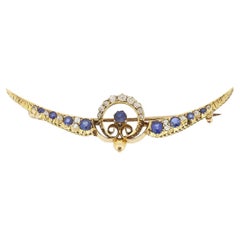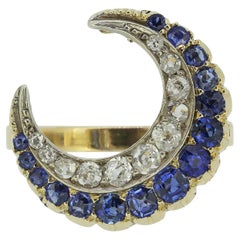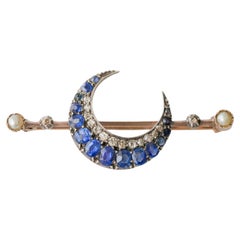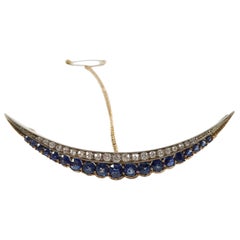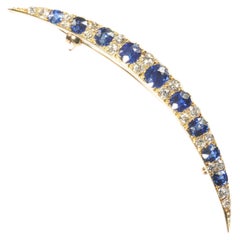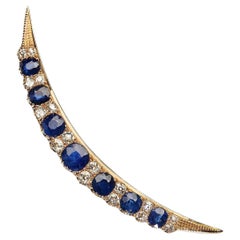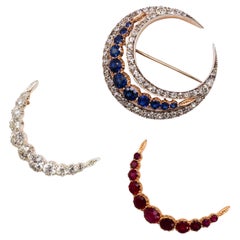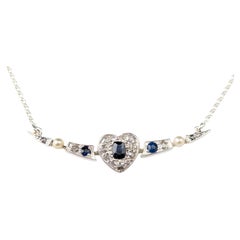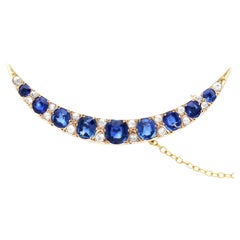Sapphire And Diamond Crescent
Antique 19th Century Victorian Brooches
Diamond, Blue Sapphire, Gold, Yellow Gold
Antique 19th Century Victorian Cluster Rings
Sapphire, Diamond, Silver, Yellow Gold, 18k Gold, Gold
Antique Late 19th Century Edwardian Brooches
Diamond, Pearl, Sapphire
Antique 1890s British Late Victorian Brooches
Diamond, Sapphire, Gold, 9k Gold, Silver
Antique 1890s British Late Victorian Brooches
Diamond, Sapphire, 15k Gold
Antique 1880s British Late Victorian Brooches
Diamond, Sapphire, Gold
Antique 1890s British Victorian Brooches
Diamond, Ruby, Sapphire, Gold, Silver
Antique 19th Century British Victorian Pendant Necklaces
Diamond, Pearl, Sapphire, 9k Gold, Yellow Gold, Sterling Silver
Vintage 1920s Brooches
Diamond, Sapphire, Yellow Gold
Vintage 1960s Italian Brooches
Diamond, Sapphire, 18k Gold, White Gold
21st Century and Contemporary Italian Contemporary Pendant Necklaces
Diamond, White Diamond, Sapphire, Blue Sapphire, Gold, 14k Gold, White Gold
21st Century and Contemporary Thai Modern Fashion Rings
Diamond, Yellow Gold, White Gold, Rose Gold, 14k Gold
21st Century and Contemporary Thai Modern Fashion Rings
Diamond, Yellow Gold, White Gold, Rose Gold, 18k Gold
Mid-20th Century Unknown Contemporary Brooches
Diamond, Emerald, Multi-gemstone, Blue Sapphire, Pink Sapphire, Yellow G...
Vintage 1930s French Art Deco Brooches
Diamond, Emerald, Ruby, Blue Sapphire, Gold
20th Century European Art Deco Stud Earrings
Diamond, Sapphire, 18k Gold, Platinum
Mid-20th Century American More Jewelry
Blue Sapphire, White Diamond, 14k Gold
21st Century and Contemporary American Contemporary Dangle Earrings
Diamond, Sapphire, 18k Gold
Antique 1880s French Brooches
Diamond, Sapphire, Gold, 18k Gold
2010s American Artisan Stud Earrings
Diamond, Sapphire, 14k Gold, Yellow Gold
Antique 1890s British Victorian Brooches
Diamond, Sapphire, Gold, Silver
Antique 1890s American Victorian Brooches
Diamond, Sapphire, Blue Sapphire, Gold, 14k Gold, Yellow Gold
Antique Late 19th Century Brooches
Diamond, Sapphire, 18k Gold, Yellow Gold
20th Century Brooches
Diamond, Blue Sapphire, Gold, Yellow Gold
Antique Early 1900s American Late Victorian Brooches
Diamond, Sapphire, Gold, Silver
20th Century British Brooches
Diamond, Blue Sapphire, Sapphire, 9k Gold, White Gold, Yellow Gold
Antique Late 19th Century Unknown Victorian Bangles
Diamond, Ruby, Sapphire, 18k Gold
Antique 19th Century Unknown Victorian Brooches
Diamond, Pearl, Sapphire, Blue Sapphire, 18k Gold
Antique 1890s Unknown Brooches
Diamond, Sapphire, 15k Gold, Yellow Gold
21st Century and Contemporary Tennis Bracelets
Diamond, Sapphire, 18k Gold, White Gold
Vintage 1920s Unknown Brooches
Diamond, Sapphire, 9k Gold, White Gold
21st Century and Contemporary American Contemporary Three-Stone Rings
Blue Sapphire, Sapphire, Multi-gemstone, White Diamond, Diamond, Platinum
20th Century More Bracelets
Diamond, Sapphire, 10k Gold
Antique 1890s Victorian Brooches
Diamond, Sapphire, 18k Gold, Rose Gold, Platinum
Vintage 1910s American Edwardian Brooches
Diamond, Ruby, Sapphire, Gold
21st Century and Contemporary More Necklaces
Diamond, Gold
2010s Victorian Pendant Necklaces
Diamond, Blue Sapphire, 18k Gold, Sterling Silver
Vintage 1970s British Brooches
Sapphire, Diamond, White Gold, Gold
Antique 1880s Victorian Brooches
Diamond, Sapphire, 14k Gold
2010s American Brooches
Diamond, Sapphire, Gold, Silver
Antique 1880s Unknown Victorian Pendant Necklaces
Diamond, Blue Sapphire, Sterling Silver, Yellow Gold, 14k Gold
Early 20th Century Unknown Edwardian Brooches
Diamond
Antique 1880s British Victorian Brooches
Diamond, Sapphire, 10k Gold, 15k Gold
Antique Late 19th Century English Late Victorian Pendant Necklaces
White Diamond, Blue Sapphire, 15k Gold, 9k Gold
Antique 1890s British Victorian Brooches
Diamond, Ruby, Sapphire, 9k Gold
Sapphire And Diamond Crescent For Sale on 1stDibs
How Much is a Sapphire And Diamond Crescent?
Why Gold Shines in Jewelry Craftsmanship
Gold is the feel-good metal, the serotonin of jewelry. Wear vintage and antique gold necklaces, watches, gold bracelets or gold rings and you feel happy, you feel dressed, you feel, well, yourself.
Gold, especially yellow gold, with its rich patina and ancient pedigree going back thousands of years, is the steady standby, the well-mannered metal of choice. Any discussion of this lustrous metal comes down to a basic truth: Gold is elementary, my dear. Gold jewelry that couples the mystique of the metal with superb design and craftsmanship achieves the status of an enduring classic. Many luxury houses have given us some of our most treasured and lasting examples of gold jewelry over the years.
Since its founding, in 1837, Tiffany & Co. has built its reputation on its company jewelry as well as its coterie of boutique designers, which has included Jean Schlumberger, Donald Claflin, Angela Cummings and Elsa Peretti. There are numerous gold Tiffany classics worth citing. Some are accented with gemstones, but all stand out for their design and the workmanship displayed.
For the woman who prefers a minimalist look, the Tiffany & Co. twist bangle (thin, slightly ovoid) is stylishly simple. For Cummings devotees, signature pieces feature hard stone inlay, such as her pairs of gold ear clips inlaid with black jade (a play on the classic Chanel black and tan), or bangles whose design recalls ocean waves, with undulating lines of lapis lazuli and mother-of-pearl. And just about any design by the great Jean Schlumberger is by definition a classic.
Even had he eschewed stones and diamonds, Southern-born David Webb would be hailed for the vast arsenal of heavy gold jewelry he designed. Gold, usually hammered or textured in some manner, defines great David Webb jewelry. The self-taught jeweler made very au courant pieces while drawing inspiration from ancient and out-of-the-way sources — East meets West in the commanding gold necklaces made by Webb in the early 1970s. The same could be said for his endlessly varied gold cuffs.
In Europe, many houses have given us gold jewelry that sets the highest standard for excellence, pieces that were highly sought after when they were made and continue to be so.
Numerous designs from Cartier are homages to gold. There are the classic Trinity rings, necklaces and bracelets — trifectas of yellow, white and rose gold. As a testament to the power of love, consider the endurance of the Cartier Love bracelet.
Aldo Cipullo, Cartier’s top in-house designer from the late 1960s into the early ’70s, made history in 1969 with the Love bracelet. Cipullo frequently said that the Love bracelet was born of a sleepless night contemplating a love affair gone wrong and his realization that “the only remnants he possessed of the romance were memories.” He distilled the urge to keep a loved one close into a slim 18-karat gold bangle.
BVLGARI and its coin jewelry, gemme nummarie, hit the jackpot when the line launched in the 1960s. The line has been perennially popular. BVLGARI coin jewelry features ancient Greek and Roman coins embedded in striking gold mounts, usually hung on thick link necklaces of varying lengths. In the 1970s, BVLGARI introduced the Tubogas line, most often made in yellow gold. The Tubogas watches are classics, and then there is the Serpenti, the house's outstanding snake-themed watches and bracelets.
A collection called Monete that incorporated the gold coins is one of several iconic BVLGARI lines that debuted in the 1970s and ’80s, catering to a new generation of empowered women. Just as designers like Halston and Yves Saint Laurent were popularizing fuss-free ready-to-wear fashion for women on the go, BVLGARI offered jewels to be lived in.
Since Van Cleef & Arpels opened its Place Vendôme doors in 1906, collection after collection of jewelry classics have enchanted the public. As predominantly expressed in a honeycomb of gold, there is the Ludo watch and accessories, circa the 1920s, and the golden Zip necklace, 1951, whose ingenious transformation of the traditional zipper was originally proposed by the Duchess of Windsor. Van Cleef's Alhambra, with its Moroccan motif, was introduced in 1968 and from the start its popularity pivoted on royalty and celebrity status. It remains one of VCA’s most popular and collected styles.
Mention must be made of Buccellati, whose name is synonymous with gold so finely spun that it suggests tapestry. The house’s many gold bracelets, typically embellished with a few or many diamonds, signified taste and distinction and are always in favor on the secondary market. Other important mid-20th-century houses known for their gold-themed jewelry include Hermès and Ilias Lalaounis.
Find a stunning collection of vintage and antique gold jewelry on 1stDibs.
The Legacy of Diamond in Jewelry Design
Antique diamond rings, diamond tiaras and dazzling vintage diamond earrings are on the wish lists of every lover of fine jewelry. And diamonds and diamond jewelry are primarily associated with storybook engagements and red-carpet grand entrances — indeed, this ultra-cherished gemstone has a dramatic history on its hands.
From “A Diamond Is Forever” to “Diamonds Are a Girl’s Best Friend,” pop culture has ingrained in our minds that diamonds are the most desired, the most lasting and the most valuable gemstone. But what makes the diamond so special? Each stone — whether it’s rubies, sapphires or another stone — is unique and important in its own right. April babies might claim diamonds for themselves, but just about everyone wants this kind of sparkle in their lives!
There are several factors that set diamonds apart from other stones, and these points are important to our gem education.
Diamonds are minerals. They are made up of almost entirely of carbon (carbon comprises 99.95 percent; the remainder consists of various trace elements). Diamonds are the hardest gemstones, ranking number 10 on the Mohs Hardness Scale. Even its name, diamond, is rooted in the Greek adamas, or unconquerable. The only object that can scratch a diamond is another diamond. Diamonds are formed deep within the earth at very high temperatures (1,652–2,372 degrees Fahrenheit at depths between 90 and 120 miles beneath the earth’s surface) and are carried up by volcanic activity. Diamonds are quite rare, according to the Gemological Institute of America, and only 30 percent of all the diamonds mined in the world are gem quality.
In the 1950s, the Gemological Institute of America developed the 4Cs grading system to classify diamonds: clarity, color, cut and carat weight. Not all diamonds are created equal (there are diamonds, and then there are diamonds). The value of the diamond depends on the clarity (flawless diamonds are very rare but a diamond's value decreases if there are many blemishes or inclusions), color (the less color the higher the grade), cut (how the diamond’s facets catch the light, certain cuts of diamonds show off the stone better than others) and carat weight (the bigger, the better).
When you start shopping for a diamond engagement ring, always prioritize the cut, which plays the largest role in the diamond's beauty (taking the time to clean your diamond ring at least every six months or so plays a role in maintaining said beauty). And on 1stDibs, a range of buying guides can be found for those in the market for antique engagement rings, vintage engagement rings or Art Deco engagement rings.
Shop antique and vintage diamond rings, diamond necklaces and other extraordinary diamond jewelry on 1stDibs.
- Are sapphire diamonds real?1 Answer1stDibs ExpertApril 5, 2022No, sapphire diamonds are not real diamonds. They are actually white or colorless sapphire gemstones. Diamonds are pure carbon, while sapphires are corundum minerals that contain aluminum oxide and trace elements. On 1stDibs, find a large selection of expertly vetted diamond gemstone jewelry.
- 1stDibs ExpertFebruary 22, 2021Unless the sapphire is much bigger, a diamond is typically more expensive because it's rarer and harder.
- 1stDibs ExpertOctober 19, 2021A white sapphire is any gem-quality corundum that is either white or colorless. With a few exceptions, a white sapphire looks remarkably similar to a diamond in terms of cut and color. Diamonds will always appear brighter and have more colorful flashes than sapphires. Both diamonds and sapphires are hard and will resist everyday scratches. On 1stDibs, find antique and vintage diamond jewelry and white sapphire jewelry today.
- 1stDibs ExpertDecember 4, 2023Yes, white sapphires look like diamonds. However, their appearances aren't completely identical. Although both are white or clear gemstones, the sparkle of a white sapphire will usually appear silvery or gray in color, while diamonds have a rainbow-colored sparkle due to how light interacts with them. Shop a wide range of white sapphire and diamond jewelry on 1stDibs.
- 1stDibs ExpertAugust 26, 2024The difference between a black diamond and a black sapphire is that the two are different gemstones. A black diamond consists of carbon converted to a crystalline solid through changes driven by pressure and temperature. A black sapphire is a type of corundum, an aluminum oxide mineral. Generally, black diamonds are harder, rarer and more expensive than black sapphires. On 1stDibs, shop an assortment of black diamond and sapphire jewelry.
